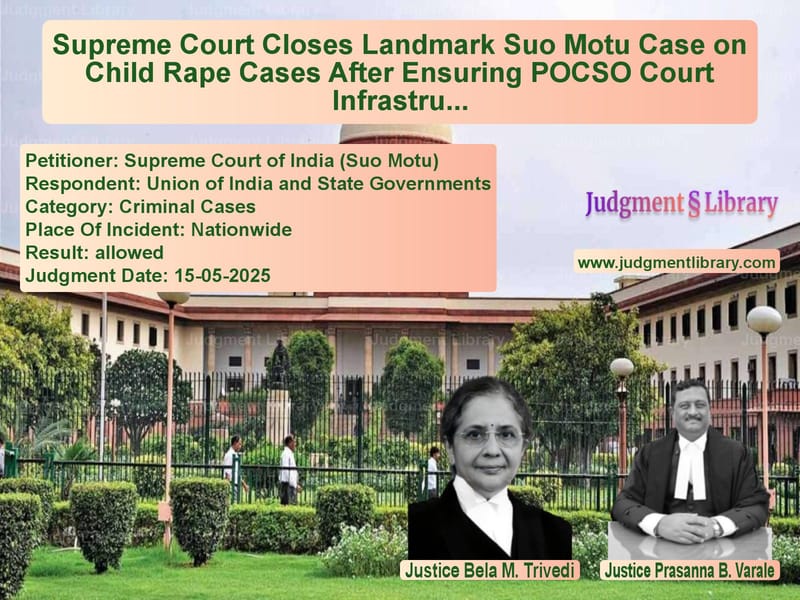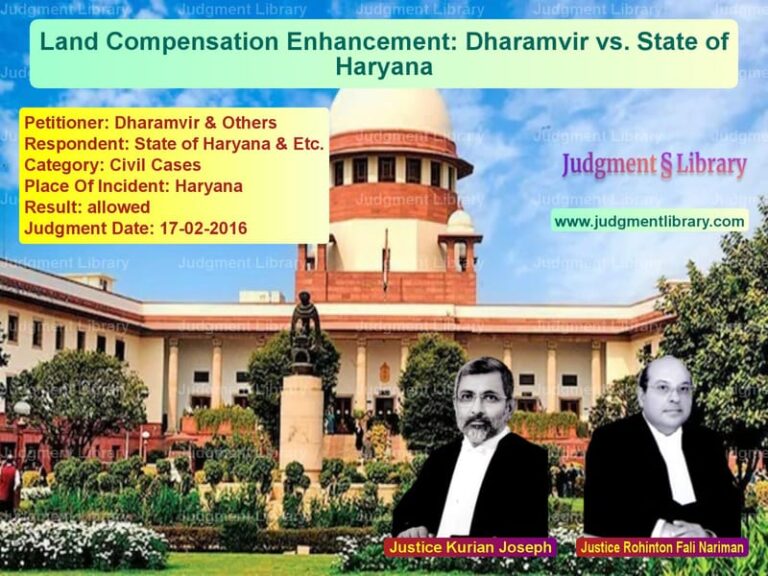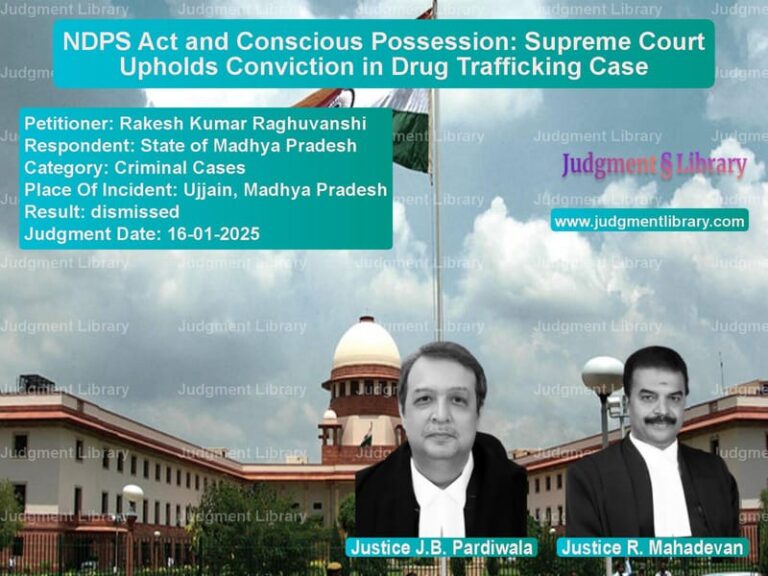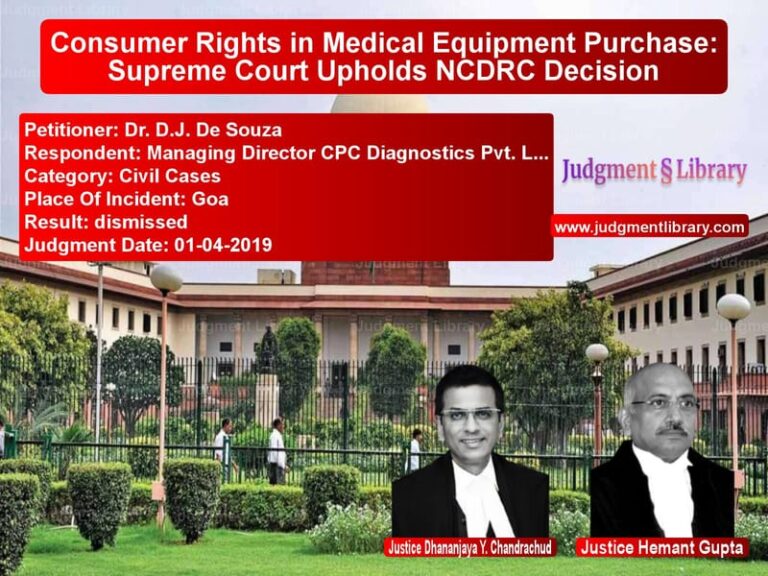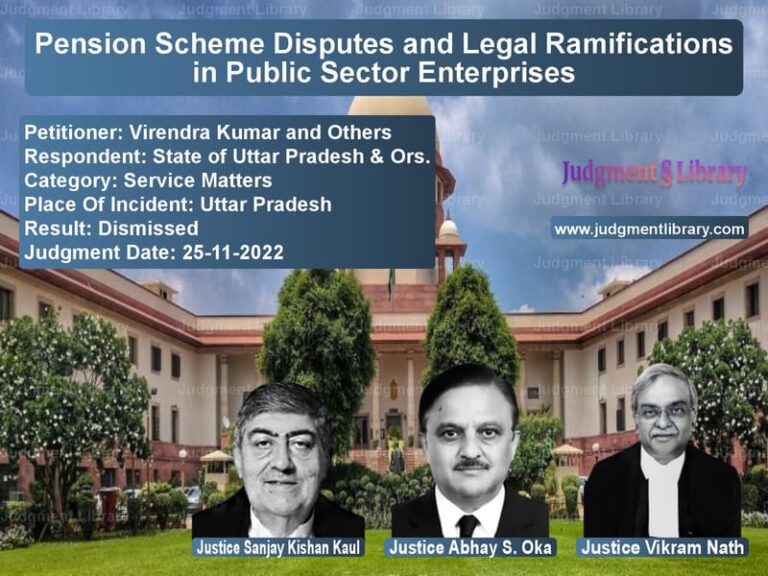Supreme Court Closes Landmark Suo Motu Case on Child Rape Cases After Ensuring POCSO Court Infrastructure
In a significant development that marks the culmination of a six-year judicial monitoring process, the Supreme Court of India has closed its landmark suo motu proceedings concerning the alarming rise in child rape cases across the country. The case, initiated in 2019 by the Court’s own motion in response to disturbing reports about increasing child sexual abuse incidents, has led to the establishment of a comprehensive infrastructure for handling POCSO cases throughout India, though some states still need to enhance their capacity to deal with the substantial pendency of cases.
The journey began on July 12, 2019, when the Supreme Court took cognizance of what it described as the “alarming rise in the number of reported child rape incidents” and directed the Registry to register a suo motu writ petition. The Court’s proactive approach reflected the judiciary’s deep concern about the escalating cases of child sexual abuse and the urgent need for systemic reforms to ensure speedy justice for vulnerable child victims. The Court immediately sought assistance from Senior Counsel Mr. V. Giri to help formulate necessary directions to address this critical issue.
The Foundation: Initial Directions of 2019
In its groundbreaking order dated July 25, 2019, the Supreme Court issued comprehensive directions that would form the backbone of India’s response mechanism for POCSO cases. The Court explicitly stated: “Having considered the matter, we have deemed it proper to issue the following directions, which will be implemented by the Union of India and the State Governments forthwith.”
The first and most crucial direction mandated that “In each district of the country, if there are more than 100 cases under the POCSO Act, an exclusive/designated special Court will be set up, which will try no other offence except those under the POCSO Act.” This directive recognized the specialized nature of POCSO cases and the need for dedicated judicial attention to ensure sensitive and efficient handling of these delicate matters.
The Court further ensured financial sustainability for these specialized courts by directing that “Such Courts will be set up under a Central scheme and will be funded by the Central Government, which fund will not only take care of the appointment of the Presiding Officer, but also the appointments of support persons, Special Public Prosecutors, Court staff and infrastructure including creation of child friendly environment and vulnerable witness Court rooms, etc.” This holistic approach addressed not just the judicial aspect but also the crucial support systems necessary for child victims.
Recognizing the importance of sensitive handling of child victims, the Court provided detailed guidelines for appointing support personnel, stating that “care should be taken to appoint persons who are dedicated to the cause and apart from academic qualifications are oriented towards child rights; are sensitive to the needs of a child and are otherwise child friendly. The same standards would also apply in the matter of appointment of Special Public Prosecutors.”
The Court also embraced innovative awareness measures suggested by the Amicus Curiae, directing that “A short clip intended to spread an awareness of the subject in general, namely, prevention of child abuse and prosecution of crimes against children, should necessarily be screened in every movie hall and could also be transmitted by various television channels at regular intervals. A child helpline number should also be displayed not only in such clip but also at various other prominent places, in schools and other public places.”
Addressing investigative delays, the Court noted that “one of the major causes of delay in winding up the investigations and in cases where chargesheets have been filed, in winding up the trial, is delay in receipt of the reports from the Forensic Science Laboratory.” While considering the suggestion for designated FSLs in every district, the Court initially directed immediate improvement in existing facilities, ordering that “the existing and available Forensic Science Laboratories in each State will function in an effective manner insofar as analysis etc. of the samples collected under the POCSO Act are concerned and reports of such analysis be sent promptly and without any delay.”
Ongoing Monitoring and Subsequent Directions
Over the next six years, the Supreme Court maintained continuous oversight of the implementation of its directions. The Court periodically called upon States and Registrar Generals of all High Courts to furnish detailed information about the status of POCSO cases and infrastructure. On November 13, 2019, after reviewing a report detailing the percentage share of different types of POCSO offences, the Court directed State Governments and the Union of India to ensure that all stages of investigation and trial contemplated under the POCSO Act were completed within the stipulated timeframe.
The Court’s monitoring revealed significant variations in POCSO case pendency across states. Recognizing this disparity, the Court “laid down separate criteria for the States of Uttar Pradesh and West Bengal where the pendency of POCSO Cases was extremely high” in its order dated December 16, 2019. This state-specific approach demonstrated the Court’s understanding of ground realities and its commitment to practical solutions rather than one-size-fits-all directives.
During the prolonged monitoring period, the Court also addressed several ancillary issues crucial for effective POCSO case management. These included expressing “grave concern about the inadequate number of Public Prosecutors in the POCSO Courts” and dealing with “the issues with regard to providing security to the Victim and the Witnesses in Unnao Case.” The Court also indicated its intention to “consider the issue of framing National scheme for payment of compensation to the victims of offences under the POCSO Act,” showing its comprehensive approach to victim support.
The Final Assessment and Closure
As the case approached its conclusion, the Court on September 24, 2024, sought updated state-wise details about the status of POCSO courts from Amicus Curiae Mr. V. Giri and Senior Advocate Ms. Uttara Babbar. The comprehensive chart and submissions they provided revealed substantial progress but also highlighted remaining challenges.
The Court noted that “majority of the States with the funding from the Central government have complied with the directions issued by the Court for setting up exclusive courts for POCSO cases.” However, it also observed that “in certain States like Tamil Nadu, Bihar, Uttar Pradesh, West Bengal, Orissa, Maharashtra etc., there is still a need to create more POCSO Courts considering the pendency of the POCSO cases.”
In its final analysis, the Court emphasized the critical importance of adhering to statutory timelines, stating: “since the timelines have been stipulated under the POCSO Act for all stages right from the stage of Investigation up to the stage of Trial, the same must be adhered to as far as possible.” The Court directly linked infrastructure adequacy with timely justice delivery, observing that “Because of the inadequacy of the number of exclusive Courts for the POCSO Cases, the said timelines mandated in the Act for completion of the trials are not being maintained.”
In its concluding remarks, the Court expressed expectations from the executive, stating: “It is therefore expected that the Union of India and the State Governments shall take appropriate steps to sensitize the officials associated with the investigation of POCSO cases, and also to create dedicated Courts to try POCSO Cases on top priority basis, and to see to it that the chargesheets are filed within the mandatory period stipulated in the Act, and the Trials are completed within the time frame as contemplated in the Act.”
The Court generously acknowledged the contributions of the legal experts who assisted in this landmark proceeding, noting: “We would be failing in our duty, if we do not place on record, our appreciation for the very able assistance rendered by the learned Senior Counsels Mr. V. Giri and Ms. Babbar during this Suo Moto proceedings.”
Legacy and Impact
The closure of this suo motu proceeding marks a significant milestone in India’s judicial response to child sexual abuse. The six-year monitoring process has transformed the landscape of POCSO case adjudication in the country. The establishment of exclusive POCSO courts across most districts has institutionalized specialized handling of these sensitive cases, ensuring that child victims receive the careful, trauma-informed justice process they deserve.
The infrastructure created as a result of this case—including child-friendly courtrooms, appointed support persons, specialized public prosecutors, and improved forensic facilities—represents a substantial advancement in the country’s child protection ecosystem. The awareness initiatives directed by the Court have potentially reached millions of citizens, contributing to prevention efforts and encouraging reporting of abuse.
However, the Court’s acknowledgment that several states still need to enhance their POCSO court capacity indicates that the journey toward comprehensive protection is not complete. The continued pendency in states like Uttar Pradesh, West Bengal, Tamil Nadu, Bihar, Odisha, and Maharashtra suggests that further resource allocation and administrative attention are necessary to fully realize the vision of timely justice for all child sexual abuse victims.
This suo motu case exemplifies the Supreme Court’s role as a sentinel on the qui vive (watchful sentinel) when it comes to protecting the most vulnerable members of society. By initiating this proceeding and diligently monitoring its implementation for six years, the Court has demonstrated that judicial intervention can catalyze significant systemic reforms in public administration and child protection mechanisms.
As the Court closes this chapter, the framework it has established continues to operate, and the expectations it has set continue to guide the executive in fulfilling their responsibilities toward child protection. The legacy of this case will be measured not just by the infrastructure created but by the countless child victims who will receive speedier, more sensitive justice because of the systems put in place through this judicial initiative.
Petitioner Name: Supreme Court of India (Suo Motu).Respondent Name: Union of India and State Governments.Judgment By: Justice Bela M. Trivedi, Justice Prasanna B. Varale.Place Of Incident: Nationwide.Judgment Date: 15-05-2025.Result: allowed.
Don’t miss out on the full details! Download the complete judgment in PDF format below and gain valuable insights instantly!
Download Judgment: supreme-court-of-ind-vs-union-of-india-and-s-supreme-court-of-india-judgment-dated-15-05-2025.pdf
Directly Download Judgment: Directly download this Judgment
See all petitions in Rape Cases
See all petitions in Juvenile Justice
See all petitions in Child Custody
See all petitions in Criminal Defamation
See all petitions in Public Interest Litigation
See all petitions in Judgment by Bela M. Trivedi
See all petitions in Judgment by Prasanna Bhalachandra Varale
See all petitions in allowed
See all petitions in supreme court of India judgments May 2025
See all petitions in 2025 judgments
See all posts in Criminal Cases Category
See all allowed petitions in Criminal Cases Category
See all Dismissed petitions in Criminal Cases Category
See all partially allowed petitions in Criminal Cases Category

